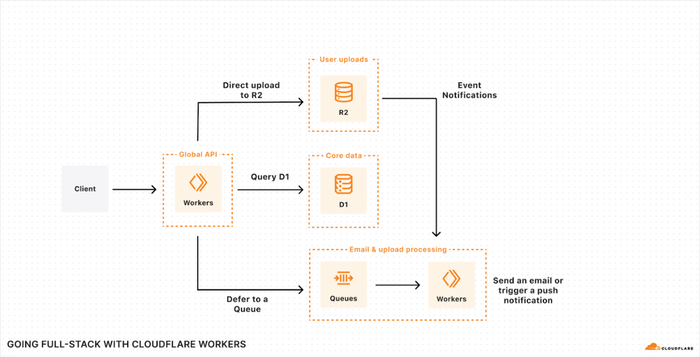Cloudflare Expands Data, Serverless, and AI Tools
Cloudflare was busy during its Developer Week 2024 event, rolling out a series of major updates to better enable organizations to build applications.

Cloudflare is growing the capabilities of its platform with an eye on enabling developers to be more productive.
As part of its Developer Week 2024 event last week, Cloudflare announced several significant updates and new features across its platform, including enhancing its serverless Workers platform, introducing new AI capabilities, and improving its R2 storage service.
Here's a summary of the key announcements Cloudflare made at Developer Week, which even included a pair of acquisitions.
Databases:
The D1 server SQL database is now generally available.
Rollout of new Hyperdrive services for accelerating existing databases.
The debut of the Workers Analytics Engine, a time-series database.
New Event Notifications service introduced.
The Pipelines streaming data ingestion service announced.
Serverless:
Cloudflare Workers can now be written in Python.
JavaScript-native remote procedure call support.
Browser rendering API now generally available.
Storage:
R2 storage migration services from Google Cloud Storage.
AI:
Workers AI for edge inference is now GA.
Acquisitions:
Acquisition of PartyKit for real-time multiuser applications.
Acquisition of Baselime for serverless application observability.
"We view providing the tooling that developers need as a critical part of our job as a platform, which is why with every Developer Week, we make it our mission to provide you with more and more pieces you may need," Rita Kozlov, senior director of product at Cloudflare, wrote in a blog post.
Cloudflare Brings More Data Power to Developers
Data is critical for building applications of all types, which is why Cloudflare has increasingly focused on adding new services to make data easier to use and build with for developers.
Headlining the recent data updates is Cloudflare Pipelines, a new service for scalable data ingestion. Pipelines will allow developers to set up serverless endpoints that can receive and process high volumes of data from a variety of sources, including HTTP, WebSockets, and Kafka queues. Developers can configure Pipelines to batch, filter, and transform data on the fly before writing it to Cloudflare's R2 distributed object storage service.
Pipelines aim to solve major pain points around aggregating and processing real-time data streams. The service handles all the underlying infrastructure and scaling, allowing developers to focus on their data processing logic. Pipelines will help teams build applications ranging from internet of things (IoT) devices to clickstream analytics.
Complementing Pipelines is Cloudflare's new Event Notifications feature for R2 storage. Developers can now configure R2 buckets to publish events when new data is written, allowing other applications to trigger asynchronous workloads in response. For instance, new user uploads could automatically kick off encoding, machine learning model training, or search indexing jobs.

For relational data needs, Cloudflare announced the general availability of its D1 SQL database service. D1 provides a fast, globally distributed SQL engine for application data. New replication capabilities allow sharded read replicas to be deployed close to users. D1 also offers a pay-as-you-go pricing model with a permanently free tier.
Cloudflare is also extending its Hyperdrive service to support MySQL databases in addition to its existing PostgreSQL support. Hyperdrive uses Cloudflare's edge network to accelerate connections to external databases.
Additionally, the Cloudflare Workers Analytics Engine is graduating from beta to general availability. This time-series analytics service makes it easy to aggregate metrics, events, and logs data from Workers scripts. Custom analytics can be implemented using SQL queries.
According to Cloudflare, these new products aim to fulfill the core data needs of modern applications, including data ingestion, storage, processing, and analytics. By handling the entire application stack, Cloudflare hopes to simplify full-stack development.
Acquisitions Set to Fuel More Cloud Growth for Cloudflare
Cloudflare is growing both organically by building its own capabilities as well as via acquisition.
Cloudflare announced two acquisitions last week to expand its serverless computing capabilities: Baselime and PartyKit.
Baselime is a serverless observability platform that helps developers understand the behavior of cloud applications using logs and distributed tracing. Baselime will be integrated into Cloudflare over the next few months, starting with OpenTelemetry support and real-time error tracking. The goal is to provide built-in observability for Cloudflare services like Workers, Durable Objects, and AI.
PartyKit is an open source platform for building real-time collaborative multiplayer apps using Cloudflare's Durable Objects. Durable Objects enable stateful serverless functions, allowing developers to maintain state across clients for synchronized experiences. By acquiring PartyKit, Cloudflare aims to make stateful serverless development even easier.
"The future of serverless is stateful, and with PartyKit's expertise now part of our arsenal, we're more ready than ever to make that future a reality," Cloudflare stated in a blog post.
About the Author(s)
You May Also Like




